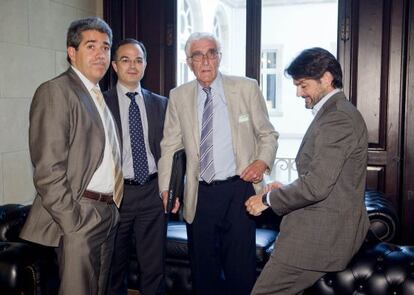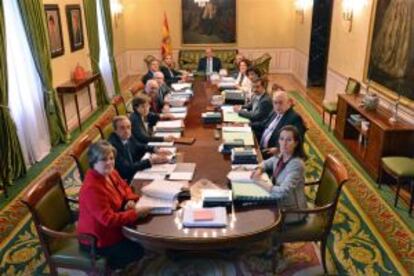Nearly all Spanish parties guilty of financial crimes, Audit Court finds
Watchdog’s chief attorney drafts damning report against national and regional groups

Nearly every significant political party in Spain, whether national or regional in scope, committed tax fraud and other financial crimes in its 2012 accounts, according to the country’s Audit Court.
The national watchdog’s chief attorney, Olayo González Soler, has drafted a damning report pointing the finger of blame at Spain’s two main political organizations, the Popular Party (PP) and the Socialist Party (PSOE), but also at Convergència Democràtica de Catalunya (CDC) and the Basque Nationalist Party (PNV), to name just a couple of others on the list.
The report, to which EL PAÍS has had access, lists serious criminal offenses that include illegal debt cancellation, accounting that does not reflect real income and expenditure, odd loans to obscure foundations, and unlawful donations.
Until now, the Audit Court has never acted against any major party for irregularities in their accounts
Sources at the attorney’s office said they could not recall such a tough reprimand ever being issued against political parties before this. The Audit Court, which has recently faced strong criticism for inefficiency and nepotism, has never firmly sanctioned any political organization for wrongdoing.
It has also been notoriously slow at analyzing parties’ finances, meaning that any violations that were ultimately uncovered could never be pursued as the statute of limitations had expired.
The report only considers the fiscal year 2012. The years 2013 and 2014 have yet to come under scrutiny.
González Soler’s report holds party leaders responsible for the violations, while also complaining about a lack of personnel to provide efficient oversight and praising recent legal reforms that reduce the impunity parties used to enjoy.

Until now, the Audit Court has never acted against any major party for irregularities in their accounts. Only very recently did it open investigations into the United Left coalition (IU) and the Aragonese Regionalist Party. Before that, it even failed to notice anything amiss with the PP’s accounts, despite former treasurer Luis Bárcenas’ revelations about an entire system of parallel accounting that allegedly was in place for two decades.
Convergència Democràtica de Catalunya (CDC). The prosecutor claims that CDC, one half of the ruling CiU bloc in Catalonia, committed crimes in its 2012 accounts. Specifically, there are €1.7 million that the party lists as revenue from services rendered to the CiU and various foundations, but which are not properly documented. The only evidence of these services are a few “internal notes” that fail to confirm whether the services existed in the first place.
CDC also made contributions to its various foundations, yet failed to reflect them properly in the accounts. The main foundation, Cat-Dem, holds that these amounts were donations, which are governed by a different legal system from contributions. The party’s 2012 accounts do not include all incoming and outgoing money, says the report, noting that the financial activity of its local headquarters is not included.
Unió Democràtica de Catalunya (UDC). CDC’s longtime partner in the Catalan executive, UDC, does not fare much better. The party’s headquarters in Girona was acquired with a loan of €402,016 that is “practically paid off” according to the report, yet still shows up as pending repayment. The party also took out a €9.5 million loan from Kutxabank, “which this lender has forgiven” to the extent that the debt has been reduced to less than €1 million. The prosecutor also highlights that UDC paid over €57,773 in expenses to an unnamed party leader, and that this money was classified as operating costs.
Popular Party (PP). The Audit Court’s report does not paint a rosy picture of Spain’s ruling party, which may be guilty of having committed “several tax crimes” in 2012. Eight lenders have provided information to the effect that the PP holds bank accounts worth a total €1.3 million that were not declared to the tax authorities. The prosecutor notes that the PP “has refused” to provide the Audit Court with copies of 34 contracts signed with alleged service providers.
The conservative group also accepted a €86,000 donation from a company that was awarded public contracts, a forbidden practice. Asked for explanations, the party said it had no way of checking whether donors have a business relationship with government agencies, and simply trusted their sworn statements.
The Bárcenas case, currently under investigation at the High Court, suggests that the PP may have accepted as much as €8 million in illegal donations over the last 20 years.
PSOE. The report identifies wrongdoing in the Socialist Party’s financial relationship with its Pablo Iglesias and Ideas para el Progreso foundations. In 2012, the party loaned at least €4.4 million to both despite the fact that this money would never be repaid, considering the foundations’ negative balances. The prosecutor also considered it irregular that the manager of the Socialist Party and the manager of the Ideas foundation were one and the same person. In 2010 and 2011, the PSOE also lent its foundations over €1 million that has since been practically written off.
The Basque Nationalist Party failed to include income worth €4.9 million in its 2012 accounts
The report underscores that it is difficult to understand why the party would do such a thing, then ask banks for a €14.7 million loan to finance a labor adjustment plan. The Pablo Iglesias foundation (named after a historical Socialist leader, not to be confused with the leader of new party Podemos of the same name) recorded its loan from the PSOE as a “contribution,” which is not taxable.
Basque Nationalist Party (PNV). The ruling party in the Basque region failed to include income worth €4.9 million in its 2012 accounts. This amount was the result of a strange and lucrative swap involving a large property. The prosecutor also says that the party unlawfully owns a complicated web of companies (some headquartered in France) whose activities could be providing a source of illegal financing. In 2012, the PNV had 357 checking accounts, savings accounts and investment funds worth a combined €3.1 million that were not included in its official accounting.
Tu suscripción se está usando en otro dispositivo
¿Quieres añadir otro usuario a tu suscripción?
Si continúas leyendo en este dispositivo, no se podrá leer en el otro.
FlechaTu suscripción se está usando en otro dispositivo y solo puedes acceder a EL PAÍS desde un dispositivo a la vez.
Si quieres compartir tu cuenta, cambia tu suscripción a la modalidad Premium, así podrás añadir otro usuario. Cada uno accederá con su propia cuenta de email, lo que os permitirá personalizar vuestra experiencia en EL PAÍS.
¿Tienes una suscripción de empresa? Accede aquí para contratar más cuentas.
En el caso de no saber quién está usando tu cuenta, te recomendamos cambiar tu contraseña aquí.
Si decides continuar compartiendo tu cuenta, este mensaje se mostrará en tu dispositivo y en el de la otra persona que está usando tu cuenta de forma indefinida, afectando a tu experiencia de lectura. Puedes consultar aquí los términos y condiciones de la suscripción digital.








































